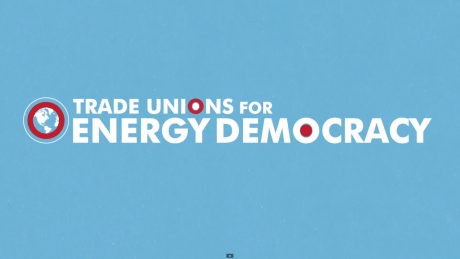News
You are here
Labour against climate change

December 15, 2015
Something exciting happened at the UN COP21 climate conference in Paris in December. However, it wasn’t the COP21 conference itself; environmental groups like 350.org overwhelmingly agree that our leaders, Justin Trudeau included, provided little leadership in Paris on the issue of climate change. But another group also met at the Paris climate talks. This group, Trade Unions for Energy Democracy is trying to build a movement to take action on climate change.
Trade Unions for Energy Democracy (TUED) includes unions and trade union federations from 17 countries, including Canada. The TUED website explains their goals, and why unions must be involved in the fight against climate change:
“We are facing an energy and climate emergency that amounts to a planetary crisis. The growing levels of fossil based energy are stretching planetary limits by raising greenhouse gas emissions and air pollution to alarming levels. This is affecting the health and quality of life of millions. The power of fossil fuel corporations has made it practically impossible to protect the health and safety of workers and communities, and union representation is under attack across the globe. It has become increasingly clear that the transition to an equitable, sustainable energy system can only occur if there is decisive shift in power towards workers, communities and the public.”
One of the sessions that TUED co-sponsored with the group Global Climate Jobs at the Paris climate conference was a forum that featured Canadian writer and activist Naomi Klein and British Labour Party leader Jeremy Corbyn. “Naomi Klein’s book This Changes Everything: Capitalism vs. the Climate and Jeremy Corbyn’s Protecting Our Planet leadership campaign statement get to the root causes of climate change, namely an economic system that serves the interests of the large corporations and the one percent,” said Sean Sweeney, coordinator of TUED. “This is the reality that unions and other social movements must confront, and it explains why the UN climate talks have failed to produce an agreement that can ensure a truly just societal transition.”
This partnership between unions and climate activists is encouraging to see. While the 1% try to sell us the idea that we must decide between jobs and the environment, we know this is not the truth. Working people must push for a just transition to clean energy, and trade unions can be part of demanding that governments act on such a plan.
Labour against fracking
One of the concrete actions that TUED has recently undertaken that is of particular interest to us in Canada is a campaign called Trade Unions Against Fracking. Their statement calls for a global moratorium on hydraulic fracturing (fracking) for shale gas, coal seam gas and shale oil, as this fracking is hazardous to the health of workers and people living in communities near the fracking wells. Their website summarizes the effects of fracking; it depletes aquifers and contaminates water supplies, as well as releasing large amounts of methane trapped in the shale. This release of methane makes fracking worse than coal in its effect on global warming, since methane is such a potent greenhouse gas.
This campaign has recently been endorsed by several Canadian unions, including PSAC, CUPE, ATU (Amalgamated Transit Union) and the Canadian Labour Congress. If your union would like more information on the campaign, or would like to endorse, you can contact Unions Against Fracking at http://unionsagainstfracking.org/contact/
Building connections between the trade union movement and the climate justice movement is essential if we want to fight to stop climate devastation. It’s not just that there are no jobs on a dead planet; collective action, through our unions and social movements is our best chance for forcing our government to act now on climate justice.
Section:










